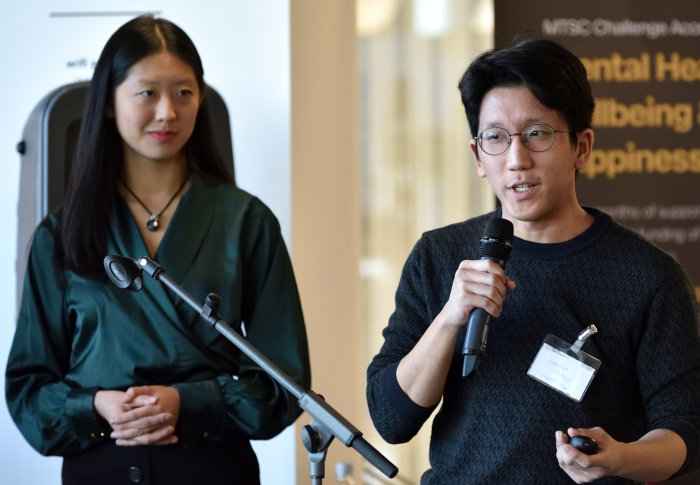Voice-based AI tool could offer clinicians a better way to track depression

Alice Tang and Woochan Hwang of Affect.AI
A machine learning tool that tracks voice changes could offer a robust way to monitor changes in mood, say founders of medtech venture Affect.AI.
The team will present their work next month at a showcase organised by the MedTech SuperConnector (MTSC) accelerator programme.
One problem with managing major depression, explains Woochan Hwang, a final-year medical student at the Imperial College School of Medicine, is that patients and clinicians often lack a robust way to monitor its progress over time, especially when a patient sees several different clinicians.
Earlier this year, Woochan, together with fellow medical student Alice Tang – now a junior doctor – and data scientist Dr Wun Wong began developing a technology venture aimed at addressing this problem. Building upon existing data showing that voice recordings can help compare an individual’s mood to that of a wider population, the team are tackling depression using a novel method comparing the patient to their own baseline over time.
Affect.AI will use machine learning combined with formal assessments by a clinician to determine how the changing characteristics of an individual’s voice track changes in that person’s mood over time. The tool is intended to allow clinicians and patients to use voice recordings made between appointments to monitor mood and in consequence better evaluate their treatment regimens.
Alice and Woochan are developing the venture with support from MTSC and feedback from specialists such as Dr Faith Matcham in the Department of Psychological Medicine at Kings College London. They are in discussions to begin trialling the approach with patients in treatment for major depression.
An entrepreneurial journey

The Affect.AI team was formed at a weekend-long hackathon (a sprint-like design event) on the theme of mental health, organised by MTSC. After standout work at the hackathon, the team were accepted onto the accelerator programme, where they benefited from equity-free funding and a range of support and training.
“Entrepreneurship is very exciting, because it empowers you to turn your idea into something more realistic,” said Woochan. “Everything I know about business and entrepreneurship is from MTSC. I never appreciated the importance of customer discovery, but as soon as you’re going out and interviewing people actively, you really see why it is useful. The connections with other organisations also helped. We had a chance to pitch to the Commercial Working Board at the Royal College of Psychiatrists and they gave us a lot of useful feedback.”
“Being comfortable adapting our idea while sticking to our core goals allowed us to make the most of industrial connections from the MTSC,” said Alice. “We were able to utilise diverse strengths from each team member to bring a clinically relevant tool into development.”
For the purpose of the programme, which brings together eight partner institutions, the Imperial students were based at the Royal College of Art (RCA). “Support-wise, RCA have been really great. I’ve been to their innovation space several times. They have a lot of their own networking events and masterclasses and their in-house advisors were very helpful. We’re very thankful for all of their support,” said Woochan.
Meet the entrepreneurs on 19 September at the MTSC showcase
 Affect.AI is just one of the teams scheduled to present their technologies and entrepreneurial journeys at the Cohort Two showcase taking place on 19 September 2019, from 2pm – 5pm, at Imperial’s South Kensington campus.
Affect.AI is just one of the teams scheduled to present their technologies and entrepreneurial journeys at the Cohort Two showcase taking place on 19 September 2019, from 2pm – 5pm, at Imperial’s South Kensington campus.
Attendees will also have a chance to hear from other researchers and entrepreneurs including Dr Rabia Lalani of BioBreathe, a venture that aims to help women adopt bespoke breathing techniques for relief of anxiety and digestive discomfort.
Rachael Katz, MTSC’s Knowledge Exchange and Impact Manager, said: “The showcase is a great opportunity for medical and med tech professionals, academics and other interested parties to meet a new generation of entrepreneurs. MedTech SuperConnector has a remit to experiment with different approaches and we are also looking forward to welcoming others working in the education and accelerator spaces to join us to network and exchange ideas”.
Full details and registration for the event are available via Eventbrite.
Article text (excluding photos or graphics) © Imperial College London.
Photos and graphics subject to third party copyright used with permission or © Imperial College London.
Reporter
David Silverman
Communications Division